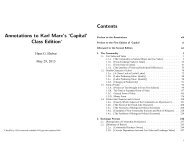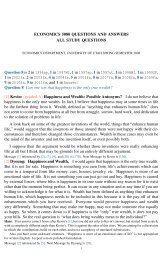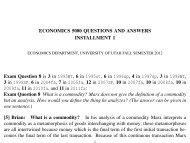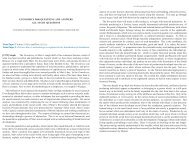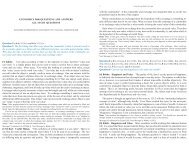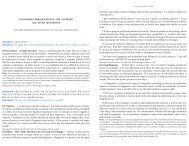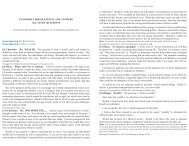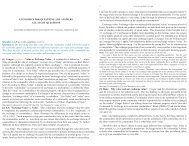Question 1 What did Marx mean with his formu - University of Utah
Question 1 What did Marx mean with his formu - University of Utah
Question 1 What did Marx mean with his formu - University of Utah
You also want an ePaper? Increase the reach of your titles
YUMPU automatically turns print PDFs into web optimized ePapers that Google loves.
U <strong>of</strong> <strong>Utah</strong> Econ 5080 2005fa 7<br />
[560] Bboarder: A commodity is “something produced for sale or exchange.” <strong>Marx</strong> also<br />
states that “a commodity is everything, whether raw material or finished good, whether a<br />
specialized brand name article or a staple, that is produced for sale.”<br />
Hans: Both are quotes from Hans’s interpretation <strong>of</strong> <strong>Marx</strong>, not from <strong>Marx</strong> himself.<br />
Message [560] referenced by [563] and [1425]. Next Message by Bboarder is [845].<br />
[563] Hans: And oh, by the way, here is another answer to your question. Bboarder,<br />
in [560], brings two different quotes from the Annotations, <strong>with</strong>out indicating how they are<br />
connected. I don’t like to have to choose between different answers. Bboarder should have<br />
written:<br />
A commodity is something produced for sale or exchange. It does not matter<br />
whether it is a raw material or finished good, whether a specialized brand<br />
name article or a staple, what matters is that it is produced for sale.<br />
By the way, Iblindone, answering a different question, also gave two unrelated answers<br />
in [538].<br />
Next Message by Hans is [567].<br />
[566] Snowy: commodity. A commodity is everything that has use-value and is produced<br />
for sale. Once an object is exchanged or sold and has use-value to its user it is a commodity.<br />
Message [566] referenced by [582], [626], and [2009fa:383]. Next Message by Snowy is [938].<br />
[572] Mason: I fully agree <strong>with</strong> the other entries on t<strong>his</strong> question but I believe that one<br />
other aspect <strong>of</strong> a commodity is wealth. <strong>Marx</strong> tells us, “that all elements <strong>of</strong> wealth are commodities.”<br />
And wealth is anything that enhances human life. And the definition <strong>of</strong> a commodity<br />
is something produced for sale or exchange, and by doing t<strong>his</strong> you are trying to<br />
increase your wealth.<br />
Hans: Wealth should not go into the definition <strong>of</strong> a commodity. Even if a commodity is not produced in order to<br />
increase the producer’s wealth, it is still a commodity. (Perhaps the producer plans to donate the prodeeds to the<br />
needy, or production has the purpose to keep the producer himself or herself from starving.)<br />
Next Message by Mason is [915].<br />
[582] Hans: It is a thing, it is a social relation. The definition “a commodity is something<br />
produced for sale or exchange” is difficult to swallow. How can the purpose for which<br />
something was produced be part <strong>of</strong> the definition <strong>of</strong> t<strong>his</strong> thing? <strong>What</strong> does that have to do<br />
<strong>with</strong> the thing itself?<br />
Presumably that is why Snowy, in [566], added the sentence:<br />
Once an object is exchanged or sold and has use-value to its user it is a<br />
commodity.<br />
T<strong>his</strong> pulls the definition into the more familiar territory <strong>of</strong> a clearly verifiable condition<br />
associated <strong>with</strong> the thing itself. Unfortunately t<strong>his</strong> additional sentence is wrong. A commodity<br />
does not become commodity through the exchange, it is a commodity ever since its<br />
production.<br />
The awkwardness <strong>of</strong> the definition comes from the fact that the thing which we call<br />
“commodity” is only the tip <strong>of</strong> the iceberg. The iceberg itself is a specific social relation <strong>of</strong><br />
production, in which products are produced privately and have to pass through the market<br />
before they can be used. T<strong>his</strong> relation does not take the form <strong>of</strong> a direct interaction between<br />
8 2005fa Econ 5080 U <strong>of</strong> <strong>Utah</strong><br />
the producers but the form <strong>of</strong> a society-induced property <strong>of</strong> the products: the products can<br />
be sold, and even must be sold if their producers want to be rewarded for producing them.<br />
In other words, the intention under which a commodity is produced enters the definition<br />
<strong>of</strong> the commodity because the commodity is more than a thing, it is a social relation.<br />
Message [582] referenced by [626], [2007SP:285], [2007fa:26], [2008fa:438], [2009fa:383], [2010fa:307], and<br />
[2011fa:143]. Next Message by Hans is [584].<br />
[588] Bosox: The definition <strong>of</strong> commodity in the book states: A commodity is something<br />
produced for sale or exchange. <strong>Marx</strong> states that value is that property <strong>of</strong> a commodity which<br />
allows it and requires it to be exchanged on the market.<br />
Is t<strong>his</strong> ok for the test or should I change it a wee bit?<br />
Hans: The sentence about value is not from <strong>Marx</strong> himself but from my Annotations. It is not necessary for the<br />
definition <strong>of</strong> a commodity. Apparently you selected it because it clarifies that a commodity which fails to be<br />
exchanged is a waste for its producer. Commodities must be exchanged. You might want to add to the stock answer<br />
“a commodity is something produced for sale or exchange” that it must be exchanged in order to be beneficial to<br />
its producer.<br />
Message [588] referenced by [626]. Next Message by Bosox is [808].<br />
[589] Mjk: A commodity is anything produced for sale or exchange. In other word,<br />
commodity is used for products which are available from many suppliers, and which are<br />
standardized so that there is no reason apart from price, for buyers to prefer one supplier over<br />
another. In <strong>Marx</strong> view, commodity is everything, whether raw material or finished goods,<br />
whether a specialized brand name article or a staple, that is produced for sale. Commodity<br />
would be the final products which are ready to be sold or exchanged in the market between<br />
the buyers and sellers.<br />
Hans: Your answer is very close to the text in the Annotations, but the few changes you made show that you <strong>did</strong><br />
not understand the text.<br />
Next Message by Mjk is [618].<br />
[591] Camhol: In [2004fa:15], Hans replied to the writer Toby that “<strong>Marx</strong>’s definition <strong>of</strong><br />
‘commodity’ is very broad. He does not care whether the thing is a finished consumer good<br />
or a raw material or an investment good, if they are produced for sale they fall under <strong>his</strong><br />
definition <strong>of</strong> ‘commodity’. <strong>Marx</strong> uses such a broad definition because a capitalist firm does<br />
not care either whether they produce one or the other, as long as can make money from it.”<br />
I believe that is exactly what defines a commodity. It is an item, be it anything, that has<br />
a perceived exchange value that leads to somebody placing that item up for either sale or<br />
exchange. T<strong>his</strong> can be anything. I can trap air in a bottle and if I create enough perceived<br />
value in that air, I could exchange it to somebody else. Once that exchange value is placed,<br />
that air has become a commodity. So in short, anything that is produced for sale or exchange<br />
is labeled a commodity.<br />
Hans: Some overpriced frills have become legends (pet rock, hoola hoop, cabbage patch dolls) but for an explanation<br />
<strong>of</strong> the commodity they are irrelevant.<br />
Next Message by Camhol is [761].<br />
[592] Synergy: graded B A commodity is anything that is produced for the purpose <strong>of</strong><br />
being sold. Whether the good is raw materials or finished goods, if the capitalist firm can<br />
make money <strong>of</strong>f <strong>of</strong> it then it is considered a commodity. [2004fa:15] It could also be looked<br />
at as the perceived exchange value. If the perception is that there will be value in a good,<br />
then it is considered a commodity.



